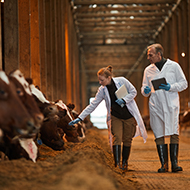
Move will allow temporary registrants to undertake export health certification or meat hygiene work.
RCVS Council has approved new proposals that will allow temporary registrants to undertake Official Veterinarian (OV) work - including export health certification and meat control - to ease the pressure on OV numbers following Britain's exit from the EU.
The proposals from Defra were brought to a meeting of RCVS Council on Thursday 18 March by the chief veterinary officer (CVO) Christine Middlemiss. They will allow temporary registrants to carry out specifically defined OV work for up to 12 months – with the possibility of an extension of six months – provided they: have the necessary skilled worker visa; hold an accredited or approved European Association of Establishments for Veterinary Education degree; have passed the relevant OV training courses.
The RCVS Temporary Register currently allows vets who are not eligible for full registration under the Veterinary Surgeons Act to be able to undertake strictly defined work under the supervision of a senior OV. Those on the temporary register do not receive MRCVS status and so, under previous rules, would not have been able to carry out export health certification and official controls.
RCVS Council members approved the proposals by a slim majority, with 11 voting for, 10 against and three abstentions. Concerns were raised about the precedent that could be set by allowing those without MRCVS status to carry out certification and the lack of planning for alternative options.
RCVS registrar Eleanor Ferguson said: “While we recognise the need for the government to respond in a quick and agile way to the increased demands placed upon OV capacity, as the regulator we do share some of the concerns voiced at the Council meeting as regards the potential lowering of veterinary standards, albeit those temporary registrants will only be able to carry out very defined veterinary work and will not attain MRCVS status.
“We have made it clear to Defra that the Temporary Register is to be used sparingly and where there is a genuine and urgent need, and we have received reassurances that applications to join the Temporary Register for the purposes of OV work will be a measure of last resort where there is significant risk of being unable to fulfil the required export health certification or meat hygiene work.”
CVO Christine Middlemiss, commented: “We are continuing to support the vital work that the veterinary sector is undertaking to protect public health, animal health and welfare and to support the certification of exports now that we have left the EU.
“As part of this process, we are working closely with the RCVS to allow the temporary registration of additional vets to ensure these standards are maintained during the ongoing pandemic.”



 The Federation of Independent Veterinary Practices (FIVP) has announced a third season of its podcast, Practice Matters.
The Federation of Independent Veterinary Practices (FIVP) has announced a third season of its podcast, Practice Matters.